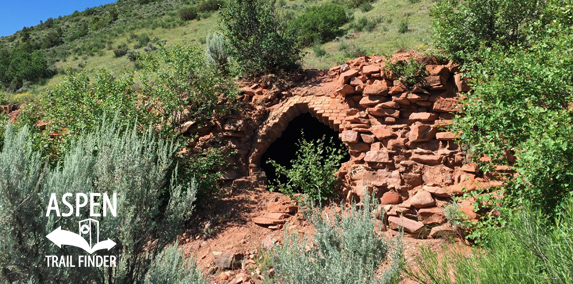Connects: Cardiff Trail

Cardiff Coke Ovens in Glenwood Springs
Glenwood Springs, CO – Coke Ovens
The Cardiff Coke Ovens are a series of coke ovens in Glenwood Springs, CO. These coke ovens are listed on the National Register of Historic Places.
More information about the Cardiff Coke Ovens can be found at:
National Register of Historic Places – Cardiff Coke Ovens
In the 1880’s, the silver riches discovered at Aspen could not be realized without benefit of coal to smelt the silver ore. A high grade fuel with little impurities was needed. The coking of coal, which is the process of heating coal to extreme temperatures to remove the impurities, was prevalent throughout the Roaring Fork Valley. However, nowhere locally were the coal coking operations as large or as profitable as at Cardiff. In September of 1887, the Grand River Coal and Coke Company selected this site, named Cardiff in honor of the coal town in Wales, as its location for their coal coking operation. This site was strategically located near the high quality bituminous coal mines located at Marion, Spring Gulch, Jerome Park and Sunlight. By December of 1887, the town site was established, the Colorado midland Railroad had been built to the site and the first 50 of 240 brick coke ovens had been constructed. In January of 1888, the first coal was delivered and the ovens were fired. In 1892, the mining and coke operations were assumed by the Colorado Fuel and Iron Company, which dominated the region’s coal mining industry. The Silver Panic of 1893 created a decline in the mining of precious metals and a cutback in smelting operations; however, C.F. & I. managed to remain strong in a competitive coked coal market. By 1895 the Cardiff ovens were producing 65,000 tons per year. The production remained strong into 1900 but demand fell steadily until 1915 when the ovens were closed.
The Cardiff Community
Because of the industry, Cardiff grew into a thriving community, complete with a school, a hotel and several mercantile establishments. The incandescent glow of the ovens could be seen throughout the valley at night and the ovens’ smoke continually shrouded the community. At its height, Cardiff was home to 250 people. The booming demand for coal also brought immigrant miners, many from Italy and Wales. Many miners gave their lives, some literally, to the dangerous production of coal. The town of Cardiff declined after 1915 and the ovens remained idle. In 1934, the town site and ovens were purchased by George Sumers, a New York investment danker. Summers built his summer home, a large log lodge, near the Cardiff site, incorporation the stone from the coke ovens into the lodge’s foundation and fireplace. George Sumers’ lodge is still standing in what has now become the Glenwood Park subdivision.
Preserving the Coke Ovens
In 1993, a majority of the coke ovens were demolished to make way for light industrial development. The remaining 52 ovens were placed on the National Register of Historic Places in 1996 and the land containing ten of the ovens was deeded to the Frontier Historical Society in Glenwood Springs. What remains of this piece of industrial history of the lower Roaring Fork Valley is fragile. Please treat this place with care and respect so that others may enjoy it for many years to come.
To obtain more information on the coke ovens or any other aspect of Glenwood Springs’ history or to report vandalism of this site, contact the Frontier Historical Society at (970) 945-4448. Please visit the Frontier Historical Museum at 1001 Colorado Avenue in Glenwood Springs.”

























